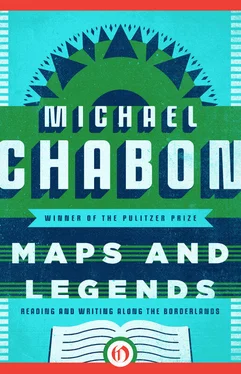By the time I sat down to interview Will, in 1996, I was better educated. I had just started to write the novel that became The Amazing Adventures of Kavalier & Clay. A crucial part of my preparatory research was getting hold of all the Eisner I could find — the Spirit, the graphic novels, the books of comics theory — and the truth of Jules Feiffer’s claims was obvious. Eisner brought radical technical innovations to the comics page — some borrowed from the movies, some from the theater, some from the fine-art tradition — and that was impressive and important. But the amazing thing about his Spirit work — all of Eisner’s tricks and technical bravado, his wild angles and striking use of shadow — was how fresh and new it still looked, even after fifty years of constant imitation by peers, inferiors, and successors. A parallel can be drawn here to Citizen Kane, and to a certain extent Eisner and Welles stand as parallel figures in their respective media. Both of them were prodigiously gifted and managed at a young age to get their hands on a vehicle — a Hollywood studio, a newspaper syndicate — that would allow them to put on a dazzling display of those gifts. Both had a phenomenally sharp eye for talent in others, and the knack for yoking it to the service of their own schemes and ambitions. Both of them served as the secret and open inspiration, as touchstone and mark of comparison, for the generations of directors and comic-book artists who followed them. But Will Eisner had something — was something — that Orson Welles never quite managed, or permitted himself, or possessed a head hard enough to be: Will Eisner was a businessman. He was a Welles and a Selznick, a Brian Wilson and an Ahmet Ertegun. He was labor and management. He was the talent and the guy who had to fire the talent. Sometimes he signed the paychecks, and sometimes he was hanging on, himself, until the next one. He started companies, negotiated contracts, acquired rights, packaged material for sale. At the same time that he was practicing all that capitalism, he was dreaming and writing and drawing. He revolutionized an artistic medium, opened it up and theorized it and made it a superb vehicle for his memories, his emotions, his way of looking at the world. He had his failures, as an artist and as a businessman, because he took risks, as an artist and as a businessman.
Sometimes it’s hard, trying to make art you know you can sell without feeling that you are selling it out. And then sometimes it’s hard to sell the art that you have made honestly without regard to whether or not anyone will ever want to buy it. You hope to spend your life doing what you love and need and have been fitted by nature or God or your protein-package to do: write, draw, sing, tell stories. But you have to eat. Will Eisner knew that. He knew what it felt like to be hungry, to feel your foot graze against the cold hard bottom. He knew how lucky you were to be born with a talent that people would pay you to share. But he was also graced with the willingness (and, when he was lucky, the ability) to get people to pay a little bit more, to drive the price a little bit higher, to hold out for a better deal or a. lower price from his suppliers. Will Eisner was a great artist and a skilled businessman; inextricably both. I loved that about him. More than fifty years after the first issues of Blackhawk and Doll Man and the other titles that he and his partner Jerry Iger packaged for Quality Comics had hit the newsstands, he still remembered the sales figures, the distributors’ names, the dime-and-dollar details of hits and flops. And I sensed that all that stuff was every bit as interesting — every bit as important — to him as the nuance of an inked line, the meaning that could be compressed into and sprung from three square panels in a row. There may be many routes to happiness for a man; there may be only a few. But in his artistry and acumen — in the way he moved so comfortably through the world as an artist who worked for money and as a businessman who worked for art, I think that Will Eisner came awfully close to finding one of those routes. He was lucky like that.
I STARTED TO WRITE The Mysteries of Pittsburgh in April of 1985, in Ralph’s room. Ralph was the Christian name of a man I never met, the previous owner of my mother’s house on Colton Drive, in the Montclair District of Oakland, California. He had died, hit by a car while standing at the end of his driveway, shortly before his house was sold. I always pictured him as a stooped, soft-spoken man in a cardigan, scorned by the world, who retreated to his laboratory, where he turned into Ernest Thesiger and called wild Transylvanian lightning down from the skies. His so-called room was in fact a crawl space, twice as long as it was wide, and it was not very wide. It had a cement floor and a naked light bulb. It smelled like dirt, though not in a bad way — like soil and cold dust and bicycle grease. Most people would have used it for suitcases and tire chains and the lawn-darts set, but at some point this Ralph had built himself a big, high, bulky workbench in there. He built it of plywood and four-by-fours, with a surface that came level to the waist of a tall man standing. It might have been a fine workbench, but it made a lousy desk, which is how I used it.
I was living with my mother and my stepfather that spring, working as an assistant in my stepfather’s optometry office and trying to get the hang of California. I had moved from Pittsburgh in December with the intention of applying to an MFA program out here. At the University of Pittsburgh I’d had three great writing teachers — Dennis Bartel, Eve Shelnutt, and Chuck Kinder — and of them Bartel had an MFA from UC Irvine and Kinder had studied writing at Stanford. Both gentlemen had said they would put in a good word for me at their respective alma maters. I’m sure Kinder did his best, but his effort could not avail, and in the end I found myself headed to UCI.
That winter I had been down to check out Irvine, whose writing program was staffed by a couple of novelists, Oakley Hall and MacDonald Harris. Of the seven first-year MFA candidates I met during my brief visit — they would of course be second-years when I showed up the next fall — all were at work on novels (three of which, by my count, were subsequently published — a pretty high rate). I rode the ferry and ate a frozen banana at Balboa Island, looked at the ocean, and wondered if Southern California would ever feel less strange to me, less of a place where people I would never know led lives I couldn’t imagine, than Northern California did. There were lots of young women walking around in swimsuits and negligibly short pants and I suppose I probably wondered how many of them I would never get to sleep with. I was kind of on a losing streak with women at the time. I was in a bad way, actually. I was lonely and homesick. I missed Pittsburgh. I missed the friends I had made there, friends about whom I felt, with what strikes me now as a fair amount of drama-queenliness, that 1) I would never see them ever again on this side of the River Styx, and 2) they were indissolubly bound to me by chains of fire. My loneliness and homesickness were of intense interest to me at the time, as were young women in short pants, novels, and my eternal-yet-forever-lost friendships, and when I read a page of Remembrance of Things Past (as it was then known), the book that was my project for the year, I felt all those interests mesh like teeth with the teeth of Grammar and Style, and I would imagine myself, spasmodically, a writer. I hope you can infer from the above description that I was not yet twenty-two years old.
I returned to chill, gray Oakland from sunny Orange County, to the little basement room in my mother’s house where I did some of my finest feeling lonely and homesick. There I ventured through a few more pages of Swann’s Way and fretted about all those people I was soon going to be surrounded and taught by, people who were and knew themselves to be proud practitioners of novelism. Was everyone obliged to write a novel? Could I write a novel? Did I want to write a novel? What the hell was a novel anyway, when you came right down to it? A really, really, really long short story? I hoped so, because that was the only thing I knew for certain that I could manage, sort of, to write.
Читать дальше
Конец ознакомительного отрывка
Купить книгу












